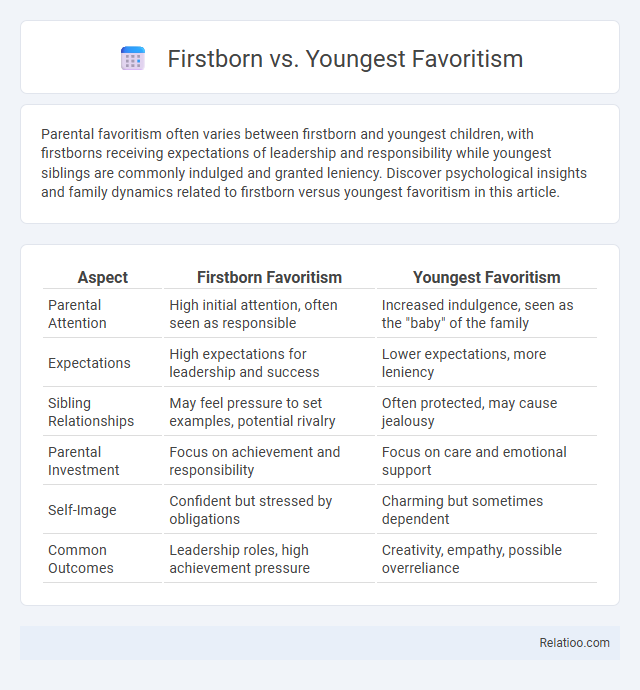Parental favoritism often varies between firstborn and youngest children, with firstborns receiving expectations of leadership and responsibility while youngest siblings are commonly indulged and granted leniency. Discover psychological insights and family dynamics related to firstborn versus youngest favoritism in this article.
Table of Comparison
| Aspect | Firstborn Favoritism | Youngest Favoritism |
|---|---|---|
| Parental Attention | High initial attention, often seen as responsible | Increased indulgence, seen as the "baby" of the family |
| Expectations | High expectations for leadership and success | Lower expectations, more leniency |
| Sibling Relationships | May feel pressure to set examples, potential rivalry | Often protected, may cause jealousy |
| Parental Investment | Focus on achievement and responsibility | Focus on care and emotional support |
| Self-Image | Confident but stressed by obligations | Charming but sometimes dependent |
| Common Outcomes | Leadership roles, high achievement pressure | Creativity, empathy, possible overreliance |
Understanding Sibling Favoritism
Sibling favoritism often emerges from parents' unconscious biases towards either the firstborn or youngest child, influencing family dynamics and individual self-esteem. Understanding these patterns requires recognizing how birth order impacts parental expectations, with firstborns frequently seen as responsible leaders while youngest children may be perceived as needing more care. Your awareness of these favoritism tendencies can help foster healthier sibling relationships and promote emotional balance within the family.
Psychological Impact on Firstborns
Favoritism, especially when comparing firstborns and youngest children, has significant psychological impacts on firstborns, often leading to increased pressure to meet parental expectations and feelings of resentment or neglect. Firstborns may develop perfectionistic tendencies and anxiety due to consistently being held as the standard for younger siblings. Your awareness of these dynamics can help foster healthier family relationships and emotional well-being for firstborn children.
How Youngest Children Experience Favoritism
Youngest children often experience favoritism as they receive more leniency and attention due to their position in the family hierarchy, which can shape their self-esteem and interpersonal skills uniquely. This preferential treatment may result in increased support but also heightened pressure to meet expectations or compete with older siblings. Understanding how your youngest child's experience of favoritism influences their development can help create a balanced family dynamic and promote emotional well-being.
Parental Behaviors Shaping Favoritism
Parental behaviors significantly influence favoritism, with firstborn children often receiving more responsibility and attention due to perceived leadership qualities, while youngest children commonly benefit from leniency and indulgence linked to their birth order. Favoritism can manifest through differential emotional support, resource allocation, and discipline strategies tailored to each child's perceived needs and parental expectations. These behaviors shape sibling dynamics and individual development, reinforcing patterns of parental favoritism based on birth order roles.
Birth Order and Personality Development
Firstborn children often receive favoritism due to expectations of responsibility and leadership, which can shape their personality development towards conscientiousness and dominance. Youngest children may experience favoritism linked to being seen as the "baby" of the family, fostering traits like charm and sociability but sometimes dependency. Favoritism impacts birth order dynamics by reinforcing distinct personality traits associated with family roles, influencing self-esteem and interpersonal skills throughout development.
Cultural Influences on Sibling Favoritism
Cultural influences significantly shape sibling favoritism, with firstborns often favored in collectivist societies that emphasize hierarchy and responsibility, while youngest siblings may receive preferential treatment in cultures valuing care and protection. Research indicates that societal norms, including inheritance customs and gender roles, strongly impact parental favoritism patterns across families. Understanding these cultural dynamics is essential to interpreting favoritism beyond individual family contexts, revealing broader social values and expectations embedded within sibling relationships.
Academic and Social Outcomes by Birth Order
Firstborn children often receive more parental attention and resources, leading to higher academic achievement and leadership skills, while youngest siblings benefit from greater social adaptability and creativity due to more relaxed parental expectations. Favoritism toward any birth order can skew these outcomes by influencing self-esteem and peer relationships, where your position may affect access to educational support or social opportunities. Understanding how favoritism intersects with birth order helps tailor strategies to optimize both academic success and social development across siblings.
Strategies to Prevent Favoritism
Implementing clear family rules and consistent discipline across all children helps prevent favoritism, whether towards the firstborn or youngest. Parents can practice equitable attention by scheduling one-on-one time with each child, fostering individual strengths and needs without bias. Open communication and encouraging siblings to appreciate each other's unique qualities reduce rivalry and promote a balanced family dynamic.
Long-term Family Dynamics and Favoritism
Favoritism based on birth order, such as Firstborn vs Youngest favoritism, significantly affects long-term family dynamics by shaping sibling relationships and individual self-esteem. Firstborns often experience pressure to meet higher expectations, while youngest children may receive more leniency, leading to feelings of resentment or rivalry that persist into adulthood. Consistent favoritism disrupts family cohesion, influencing mental health and emotional bonds across generations.
Supporting Healthy Sibling Relationships
Favoritism, whether toward the firstborn or the youngest child, can disrupt sibling dynamics and foster resentment or rivalry. Supporting healthy sibling relationships requires parents to recognize individual strengths and needs without bias, promoting fairness and open communication. Equal emotional support and validating each child's experiences strengthen bonds and reduce the negative impact of perceived favoritism.

Infographic: Firstborn vs Youngest Favoritism
 relatioo.com
relatioo.com